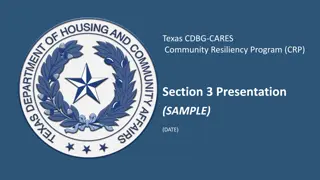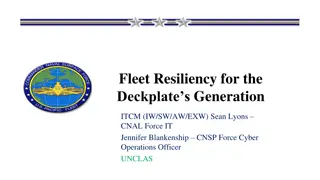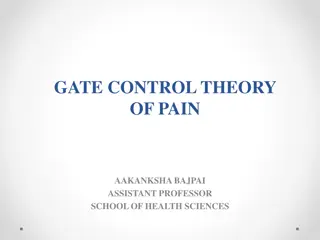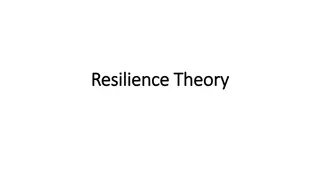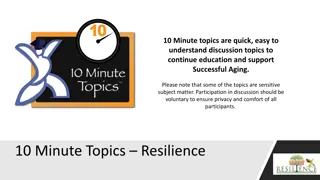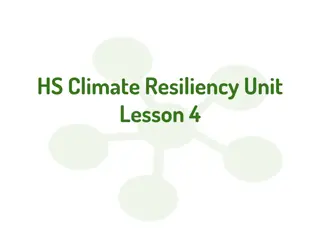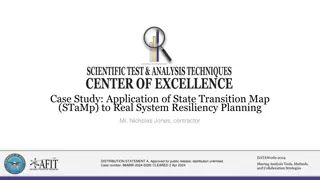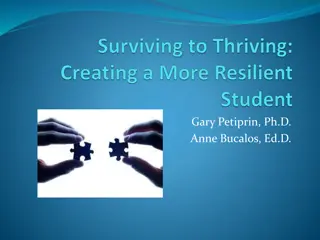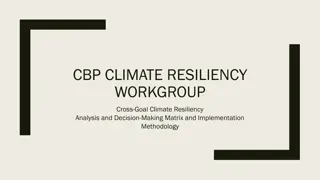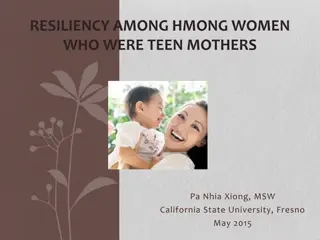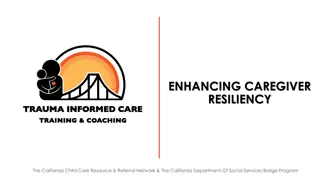Ginzburg Landau phenomenological Theory
The Ginzburg-Landau phenomenological theory explains superconductivity and superfluidity as distinct thermodynamic phases. It focuses on phase transitions characterized by singularities in specific heat at the transition temperature. Derived from BCS theory, it quantifies condensation energy, emphas
1 views • 38 slides
Crystal Field Theory in Transition Metal Complexes
Crystal Field Theory (CFT) explains the colors and magnetic properties of transition metal complexes. It focuses on the energy changes in d-orbitals of metal ions caused by surrounding ligands. This theory, developed in 1929, provides insights into the bonding interactions in complex compounds. The
10 views • 44 slides
Texas CDBG-CARES Community Resiliency Program (CRP) Grant Information
The City/County recently received a grant award for the Texas CDBG-CARES Community Resiliency Program (CRP) funded through the Community Development Block Grant. This presentation covers grant details, Section 3 requirements, and opportunities for Section 3 businesses and workers. The project aims t
0 views • 11 slides
Understanding Social Learning Theory and the Power of Example
Social Learning Theory, introduced by Bandura, emphasizes learning through observation and modeling. It explores how individuals acquire behavioral dispositions, trial-and-error experiences, and the impact of stimuli in the environment. The theory focuses on the importance of attention, retention, a
1 views • 17 slides
Evolution of Mathematical Theories and Proof Systems
Development of mathematical theories such as model theory, proof theory, set theory, recursion theory, and computational complexity is discussed, starting from historical perspectives with Dedekind and Peano to Godel's theorems, recursion theory's golden age in the 1930s, and advancements in proof t
1 views • 29 slides
Introduction to Organizational Behavior: Management Theories and Practices
Explore the evolution of organizational behavior from early management theories to contemporary practices. Understand the historical foundations and relevance of management theory in shaping workplace dynamics. Delve into key concepts like Scientific Management, Administrative Management, Bureaucrat
1 views • 28 slides
Theories on the Origin of State: Divine, Force, Patriarchal, and More
Various theories such as Divine Origin, Force Theory, Patriarchal Theory, and others explain the origin of the state. Divine theories attribute state creation to God, while Force Theory emphasizes the strong subjugating the weak to establish authority. Each theory offers unique perspectives on the h
1 views • 24 slides
Understanding Forgetting: Theories and Influence on Memory Recall
Forgetting is a complex phenomenon influenced by theories such as Decay Theory, Interference Theory, and Motivated Forgetting. The Ebbinghaus forgetting curve highlights how memories fade over time. Decay Theory suggests memories decay over time, while Interference Theory explains how old and new me
0 views • 25 slides
Psychological Theories of Criminality: Understanding the Roots
Psychological theories of criminality delve into the association between intelligence, personality, learning, and criminal behavior. Major theories include Psychodynamic Theory by Freud, Behavioral Theory by Bandura, and Cognitive Theory by Kohlberg. These theories explore how unconscious mental pro
1 views • 20 slides
Challenges and Solutions in Fleet Resiliency for the Deckplate's Generation
Fleet resiliency for the deckplate's generation faces training gaps, barriers, motivation battles, and toxic leadership issues. Lack of foundational skills and reliance on technical documentation hinder self-sufficiency. Toxic leadership and communication barriers impact motivation and retention. De
2 views • 9 slides
Austin's Theory of Law by Rinkey Sharma: An Overview
Austin's Theory of Law, presented by Rinkey Sharma, delves into the Imperative Theory of Law as proposed by Austin, known as the father of English jurisprudence. It explores General and Particular Jurisprudence, Austin's definition of law, and the elements of positive law, emphasizing the concepts o
0 views • 11 slides
Theories of International Relations Overview
The field of International Relations (IR) encompasses various theories that seek to explain global phenomena, drawing from disciplines like history, philosophy, and economics. Theory, derived from contemplation and speculation, organizes ideas to explain issues such as state emergence, conflict caus
1 views • 47 slides
Understanding the Gate Control Theory of Pain in Pain Management
This detailed content delves into the Gate Control Theory of Pain, explaining pain pathways involving nociceptors, A-delta fibers, and C fibers. It further explores central pain pathways like the spinothalamic tract, spinomesencephalic tract, and spinoreticular tract. The theory's mechanism of pain
3 views • 11 slides
Understanding the Theory of Firms: Neoclassical vs. Modern Approaches
The theory of firms is explored through the Neoclassical and Modern perspectives. Neoclassical theory focuses on profit maximization, while Modern theory delves into managerial, principal-agent, and transaction cost theories. The discussion covers criticisms of Neoclassical theory and the essential
1 views • 79 slides
Theories of Causation in Psychological and Social Sciences
Overview of theories of causation categorized into psychological, social psychological, and sociological perspectives. Psychological theories focus on instinctive, biological, and psychological qualities of abusers, including Attachment Theory, Psychodynamic Theory, Social Learning Theory, and Situa
0 views • 15 slides
Understanding Political Theory through a Contextual Approach
Exploring G.H. Sabine's perspective on political theory through a contextual approach, emphasizing the importance of historical context and societal influences. Sabine argues that while political theory evolves with its contemporary politics, it should be analyzed within its specific time and social
0 views • 9 slides
Evolution of Light Theory: From Wave Theory to Quantum Theory
At the turn of the century, the discovery of the photoelectric effect challenged the wave theory of light, leading to the development of the quantum theory by Max Planck and Albert Einstein. This new theory introduced the concept of discrete energy units known as quanta, bridging the gap between wav
1 views • 62 slides
Understanding Resilience Theory and Resiliency Framework
Resilience theory focuses on the capacity to recover quickly from difficulties, while the resiliency framework considers a strengths-based approach to understanding child and adolescent development. It explores how positive contextual, social, and individual factors known as Promotive Factors can he
0 views • 10 slides
Dp-branes, NS5-branes, U-duality, and M-Theory Overview
Overview of Dp-branes, NS5-branes, and U-duality derived from nonabelian (2,0) theory with Lie 3-algebra. Introduction to M-theory, including M2-branes and M5-branes in the strong coupling limit. Discussion on BLG theory, Lorentzian Lie 3-algebra, and the ABJM theory for M2-branes.
1 views • 32 slides
Quick Tips for Successful Aging: Resilience, Gratitude, Resiliency, Walking, Nutrition
Explore topics like resilience, gratitude, resiliency, walking, and nutrition for successful aging. Discuss ways to cultivate gratitude, enhance resiliency, incorporate walking into daily routine, and prioritize nutrition as essential components of healthy aging.
0 views • 22 slides
Chesapeake Bay Climate Resiliency Workgroup Analysis & Implementation
Increase the resiliency of the Chesapeake Bay watershed against changing climate conditions. Focus on advancing climate change goals, applying climate-smart adaptation planning, and engaging in tailored conservation approaches. Specific goals include wetlands restoration and enhancement. Utilize the
0 views • 9 slides
Understanding Climate Resiliency and Greenhouse Gases in High School Lessons
In this high school climate resiliency unit lesson, students explore the concept of albedo and its impact on temperature changes. They investigate factors affecting temperature, calculate temperatures based on albedo, and delve into understanding greenhouse gases and their contributions to climate c
0 views • 16 slides
Application of State Transition Map (STaMp) in Real System Resiliency Planning
The Department of Defense (DoD) is shifting focus towards mission risk and resilience, particularly in cyber security. Mission Based Cyber Risk Assessment (MBCRA) plays a crucial role in understanding cyber security risks and test planning. State Transition Map (STaMp) is a valuable tool for capturi
1 views • 14 slides
Understanding Time-Independent Perturbation Theory in Quantum Mechanics
Perturbation theory is a powerful tool in solving complex physical and mathematical problems approximately by adjusting solutions from a related problem with known solutions. This theory allows for more accurate approximate solutions by treating the difference as a small perturbation. An example inv
0 views • 19 slides
Ethical Theories: Divine Command vs. Virtue Theory Explained
Divine Command Theory asserts that morality is derived from God's commands, contrasting with Virtue Theory which focuses on developing moral virtues to achieve human flourishing and excellence. Divine Command Theory relies on religious texts, while Virtue Theory emphasizes the cultivation of virtues
0 views • 24 slides
Understanding Fermi Liquid Theory in Interacting Fermion Systems
Fermi liquid theory, also known as Landau-Fermi liquid theory, is a theoretical model that describes the normal state of metals at low temperatures. Introduced by Landau and further developed by Abrikosov and Khalatnikov, this theory explains the similarities and differences between interacting ferm
0 views • 23 slides
Exploring Student Resiliency and Development in Education Workshops
Delve into the discussion on resiliency in students at the Surviving to Thriving Workshop. Topics include the Six Word Memoir, qualities of resiliency, student characteristics, and holistic approaches to building resilience.
0 views • 24 slides
Understanding Resilience and Prevention in Communities of Color
This symposium explores the importance of resiliency and prevention strategies in communities of color, with a focus on overcoming challenges such as racial discrimination, cultural stressors, and premature deaths. Discussions cover suicide rates, best prevention methods, defining resiliency, and un
0 views • 22 slides
Computational Learning Theory: An Overview
Computational Learning Theory explores inductive learning algorithms that generate hypotheses from training sets, emphasizing the uncertainty of generalization. The theory introduces probabilities to measure correctness and certainty, addressing challenges in learning hidden concepts. Through exampl
0 views • 43 slides
Automata Theory and Theory of Computation Overview
This course overview covers concepts in automata theory and theory of computation, including formal language classes, grammars, recognizers, theorems in automata theory, decidability, and intractability of computational problems. The Chomsky hierarchy, interplay between computing components, modern-
0 views • 42 slides
Chesapeake Bay Climate Resiliency Workgroup Analysis & Implementation
This document outlines the goals and objectives of the Chesapeake Bay Climate Resiliency Workgroup, focusing on increasing the resiliency of the watershed to changing environmental and climate conditions. It includes strategies for monitoring, assessment, adaptation, and project goals to enhance the
0 views • 9 slides
Theories of Interest in Microeconomics II
Explore various theories of interest in economics, including the Classical Theory, Liquidity Preference Theory by Keynes, Productivity Theory, Abstinence Theory, Time-Preference Theory, Fisher's Time Preference Theory, and the Loanable Fund Theory. These theories offer different perspectives on the
0 views • 6 slides
Exploring the Evolution of Atomic Theory
Delve into the historical journey of atomic theory starting from Democritus and Aristotle's views to modern advancements proving some aspects of Dalton's theory incorrect. Learn about key laws and theories such as the Particle Theory of Matter, Dalton's Atomic Theory, and JJ Thomson's discoveries, s
0 views • 30 slides
Vegas Strong Resiliency Center - Supporting Victims of Route 91 Harvest Festival Shooting
The Vegas Strong Resiliency Center offers a range of services and support to victims, families, survivors, and responders of the Route 91 Harvest Festival Shooting in Las Vegas. Funded through a grant, this center provides assistance with lodging, transportation, legal matters, healthcare, and menta
0 views • 13 slides
Understanding Resiliency Among Hmong Teen Mothers
Explore the resiliency of Hmong women who became mothers during their teenage years, facing challenges such as high school dropout rates, juvenile delinquency, and poverty. Delve into theoretical frameworks like Resiliency Theory, Strength-Based Approach, and Self-Efficacy Theory to understand how t
0 views • 20 slides
Enhancing Caregiver Resiliency - Training Module Overview
This training module focuses on enhancing caregiver resiliency through identifying signs of compassion fatigue, developing strategies to improve professional quality of life, and creating a comprehensive self-care plan. It covers topics such as trauma, building trust with children, self-insight, and
0 views • 32 slides
Macromechanical Analysis of Lamina and Tsai-Hill Failure Theory Overview
The Tsai-Hill failure theory is based on the strengths of a unidirectional lamina, incorporating longitudinal and transverse tensile and compressive strengths, as well as in-plane shear strength. This theory, derived from the distortion energy theory, provides criteria for determining lamina failure
0 views • 15 slides
GangES: Gang Error Simulation for Hardware Resiliency Evaluation
GangES introduces a new error simulator to expedite full error simulations for assessing hardware resiliency. By reducing the number of simulations and leveraging program structure, it achieves significant time savings over existing methods. Additionally, the study explores the feasibility of progra
0 views • 38 slides
Submarine Cable Resiliency Report Update - September 2016
This update presents the final findings of Working Group 4A on Submarine Cable Resiliency, focusing on the importance of coordinating federal, state, and local agencies to mitigate risks to submarine cable infrastructure. The report highlights the critical role of regulatory coordination and geograp
0 views • 11 slides
Submarine Cable Resiliency Update and Recommendations
Working Group 4A provides updates on the status of submarine cable resiliency, highlighting the risks to infrastructure due to lack of coordination across agencies and clustering of cable routes. The group aims to enhance regulatory coordination and promote geographic diversity to ensure network res
0 views • 7 slides


